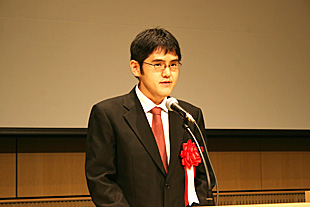 The Winner of the 10th Asia Pacific Research Prize (Iue Prize) :
The Winner of the 10th Asia Pacific Research Prize (Iue Prize) :
Dr. Masayuki Ueno
Title of Dissertation :
"Religious Privileges" and "Political Rights" of the Non-Muslims in the Tanzimat-Period Ottoman Empire: The Case of the Armenian Community

- Dr. Masayuki Ueno
-
- Career -
Masayuki UENO is a postdoctoral fellow of the Japan Society for the Promotion of Science (JSPS). His main research arena is the non-Muslim community under the Ottoman rule, with a focus on the Armenian Patriarchate of Istanbul. Ueno received his B.A. in 2002 from Tokyo University of Foreign Studies, his M.A. in 2004 and Ph.D. in 2010 from Graduate School of Arts and Sciences, University of Tokyo. He served as a research fellow (DC2) of JSPS from 2008 to 2010. His current project is titled, "The Armenian Patriarchate of Istanbul and Provincial Armenians in the Nineteenth-Century Ottoman Empire."
- Summary -
- "Religious Privileges" and "Political Rights" of the Non-Muslims in the Tanzimat-Period Ottoman Empire:
The Case of the Armenian Community -
The Ottoman Empire managed to maintain more than 600 years of rule over disparate peoples in its vast territory ranging from Western Asia to the Balkans. While this multireligious and multiethnic empire held the principle of Muslim superiority over non-Muslims, it tolerated the latter's religious freedom within their confessional communities area by area. My dissertation focused on one of the non-Muslim communities, the Christian Armenians, and it revealed a phase wherein the Armenian patriarchate of Istanbul expanded its influence over the whole Armenian population in the empire as the holder of the privilege.
In the first half of the nineteenth century, the Armenian society under the Ottoman rule experienced a drastic change owing to the spread of schooling and emergence of periodicals. The clergy in the Istanbul Patriarchate utilized these changes to strengthen the integrity of the community. Moreover, they incorporated influential laymen into the administration of the community by establishing councils and committees in the patriarchate. These councils and committees were institutionalized by the sanction of the Ottoman government in 1863. The leading figures in the patriarchate became involved in provincial Armenians' affairs with the official support of the government. As a part of this trend, they intervened in the affairs of other religious authorities in the Armenian Church. Besides, the leading figures found it beneficial to address the situation of Eastern Anatolia, which was home to majority of Armenians. These involvements ended up with the rise of Istanbul Patriarchate as the sole political center of the Armenian community in the Ottoman Empire.
During the abovementioned phase, the leading figures needed to depend on the authority of the Ottoman government. In addition, they were incorporated into the Ottoman bureaucracy. Thus, the Ottoman government put the Armenian community under its control through them. Such intermediaries enabled the functioning of the Ottoman pluralistic society.






